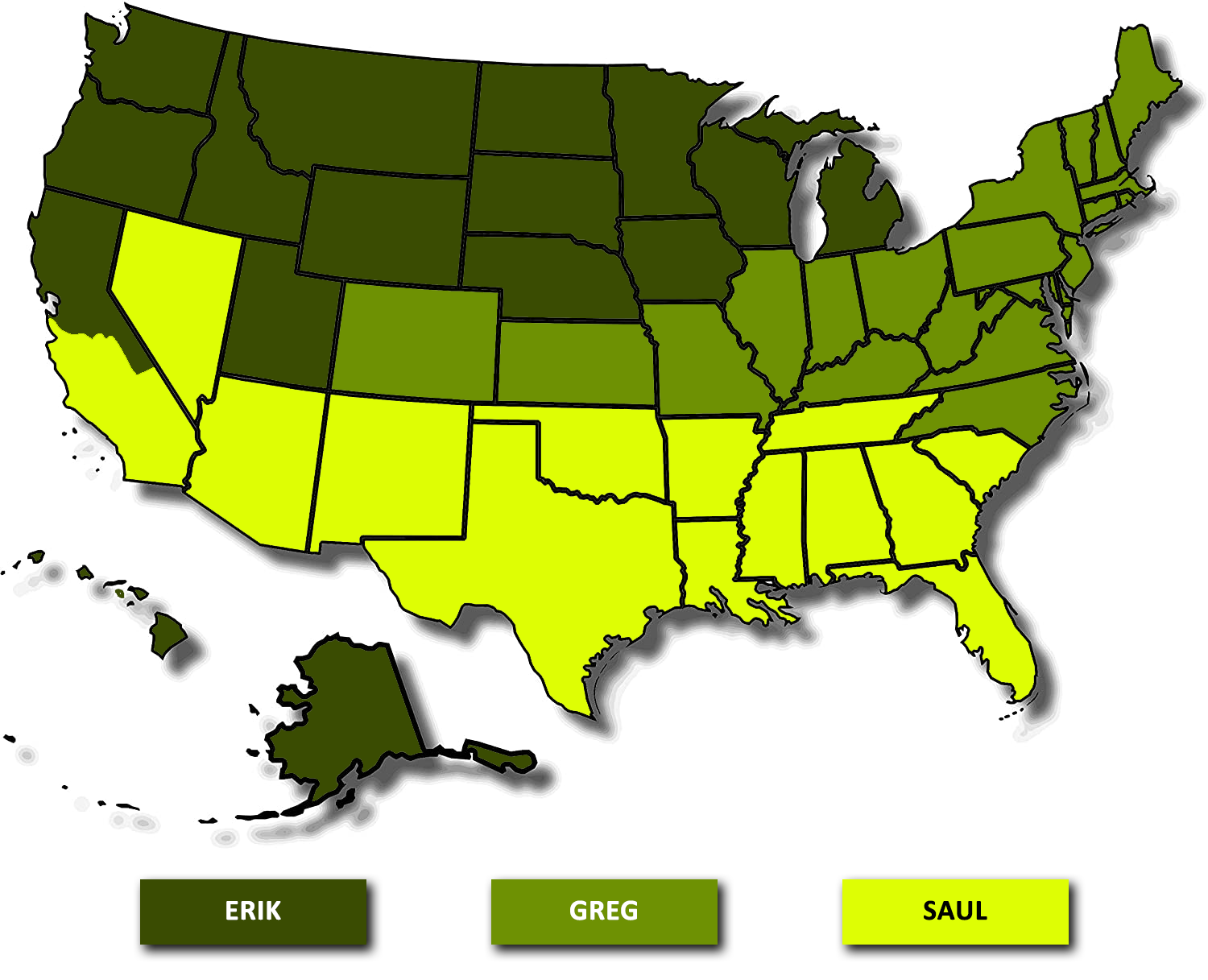IPM Integrated Pest Management
WHAT WE DO
What is IPM?
Integrated Pest Management (IPM) is focused on the long-term prevention of crop damage from pests and diseases by combining a structured combination of tactics including cultural practices, selection of resistant cultivars, manipulation of habitat and biological control.
Our elite team of IPM professionals encourage the use of chemical control measures only when absolutely needed and according to established guidelines. When applications are made, the goal is the removal of only the target organisms by avoiding the use of broad-spectrum insecticides. Human health, nontarget organisms, the environment and other factors are used when pest control measures are selected and applied.
The tactics used in IPM can be illustrated best with the IPM Pyramid. This icon shows the order in which control measures should be taken.
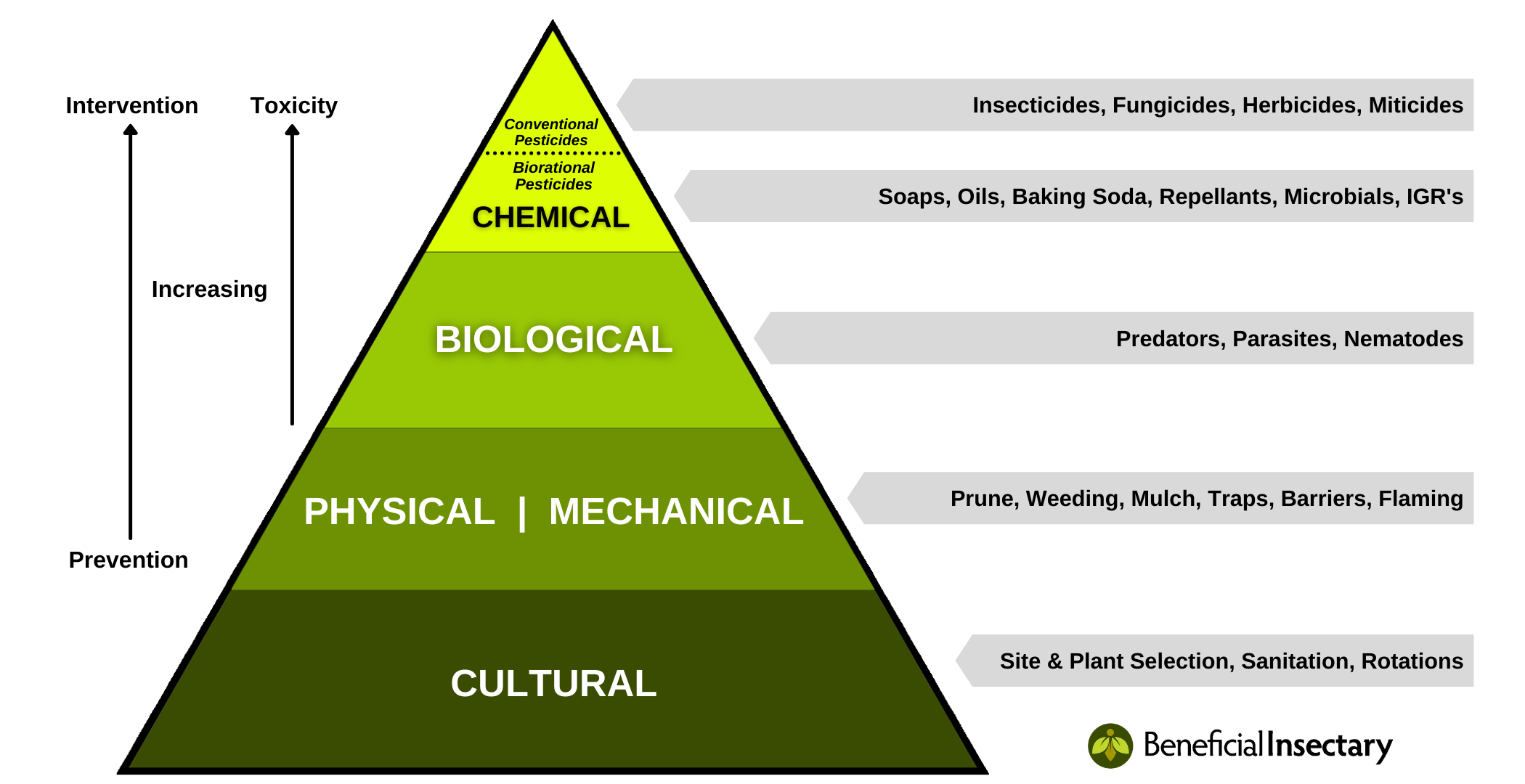
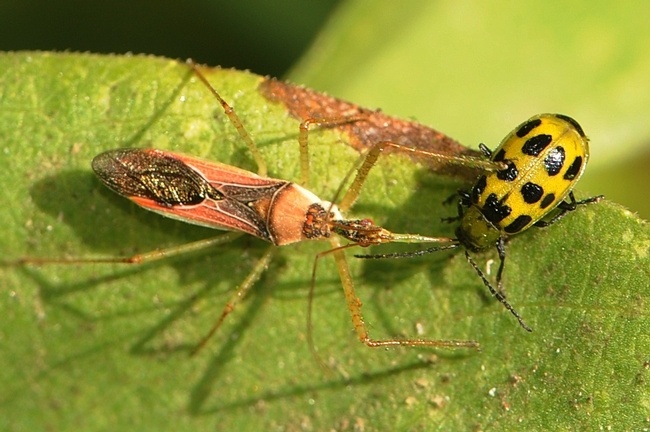
WhAT WE PROVIDE
What Is BioControl?

Definition
The use of a population of one organism to reduce the population of another invading organism.

Biological Control is the use of living natural enemies for the control of plant pests. It is an action taken by people using enemies or antagonistic organisms to kill or disrupt the feeding of plant parasites. These beneficial organisms may be predators, parasites, parasitoids, pathogens, or competitors of the target pest. The efficacy of a biocontrol program hinges upon prevention, and relies on having cultural and physical controls in place. Biological Control is another tool in the toolbox of IPM. It is not intended to replace or add a shortcut to the IPM approach.
our ipm professionals
Meet the Team

Cody Seals
US Product Manager
Cody Seals first began his journey into the world of plant pests and diseases while pursuing a bachelor’s degree in Plant and Soil Science from Middle Tennessee State University. He worked for University of Tennessee’s extension program in conjunction with USDA-APHIS on the state CAPS program, and upon completion of his bachelor’s degree in Entomology and Plant Pathology from University of Tennessee, he was offered an opportunity to attend their master’s program for entomology and plant pathology. With a focus on determining the ecology of cannabis produced in the Southeast, once he completed his master’s degree he remained in the cannabis space and began working with farmers across the southeast to navigate this new crop. He joined the Beneficial Insectary team in 2022 as U.S. Product Manager.

Erik Van Der Sluys
IPM Specialist
While working on a degree in Ecological Systems, Erik worked as a farm manager of a small two acre location in Seattle. After graduation, he got a job as a grower for a medicinal cannabis facility in Seattle. He then transferred to an ornamentals greenhouse in the Willamette Valley for a few years, where he gained the majority of his working knowledge using natural predators for pest management. Now working with the solutions, he provides to his clients all over the country.

Abbie Rosenthal
IPM Technical Specialist
Abbie has a degree in Agricultural Science. After previously working with Biobest, she has followed her passion in the agriculture industry while joining us at Beneficial Insectary. She continues to help farmers and ranchers grow a more sustainable crop by utilizing natural resources. Abbie has been working in biocontrol for 10 years, and is continuing to expand her knowledge of the industry by furthering her education. She’s here to help find solutions!
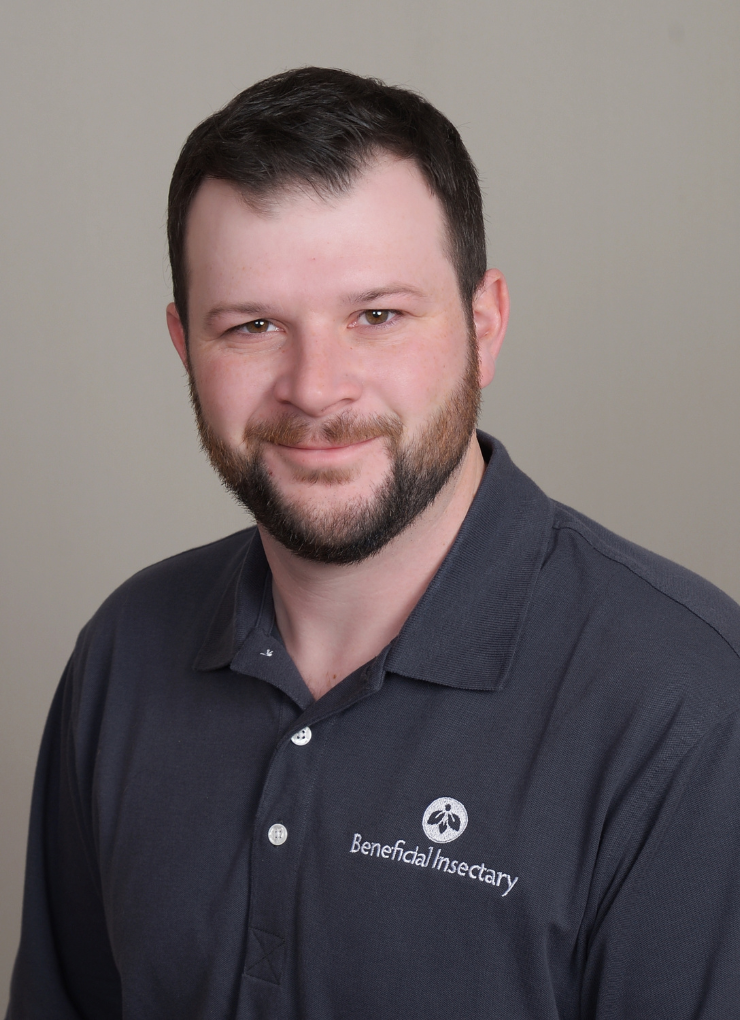
Cody Mitchem
IPM Specialist
Cody’s journey into IPM started in 2016 as a consulting arborist in Sarasota, FL. From that role he learned the basics of IPM and plant health. In 2019 he moved to Illinois, where he worked for two years as an IPM manager. He maintained an insectary to produce their own biologicals on site. While in Illinois he developed IPM programs for an 80+ acre hemp production and ornamental production. After leaving Illinois, he went to Costa Farms in Miami, FL. At Costa he developed IPM programs for all propagation and hibiscus stock. With an emphasis on using biologicals over chemicals, he developed an insectary to produce beneficials. He also combined conventional insecticides to develop an IPM program that used multiple methods of prevention.
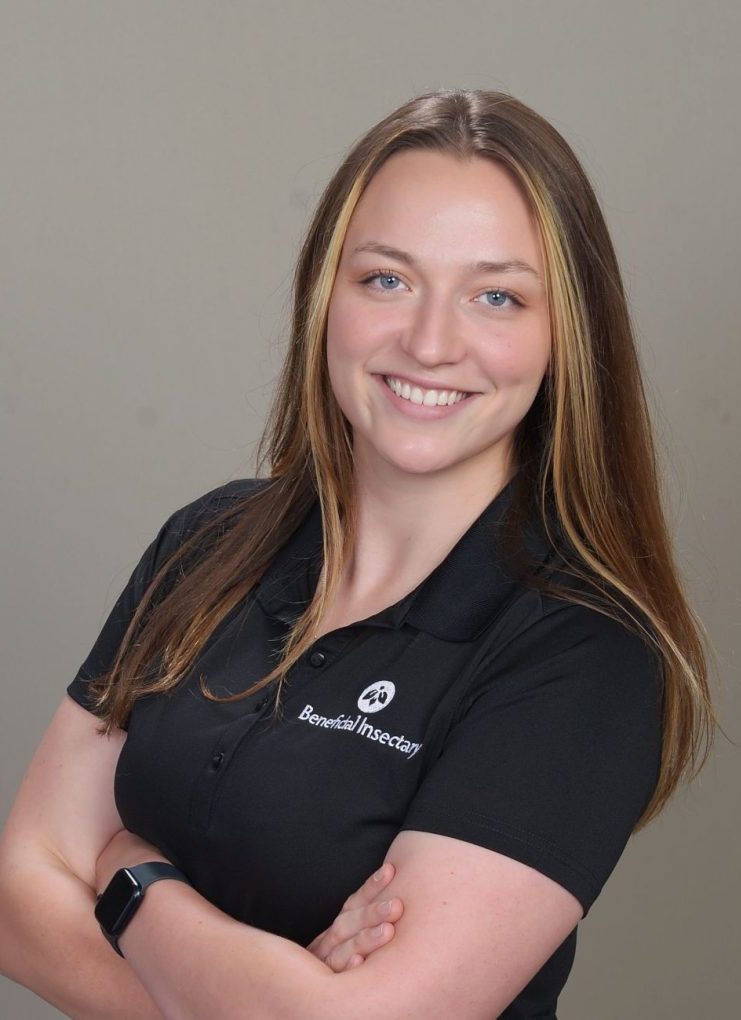
Jasmine Horton
IPM Specialist
While pursuing her bachelor’s degree in plant science at the University of Florida, Jasmine interned at Costa Farms, where she built an insectary for the production of Dalotia coriaria and developed educational materials for scouts in the propagation and hibiscus stock areas. After graduating, she relocated to San Jose, California, where she served as both Nursery and IPM Manager for a 30,000 sq ft cannabis grow. Jasmine later transitioned to a role in Somerset, Kentucky, managing a 30-acre facility focused on cultivating strawberries and cucumbers under glass. There, she developed and implemented an IPM program for both crops, integrating biological controls with conventional pesticides.
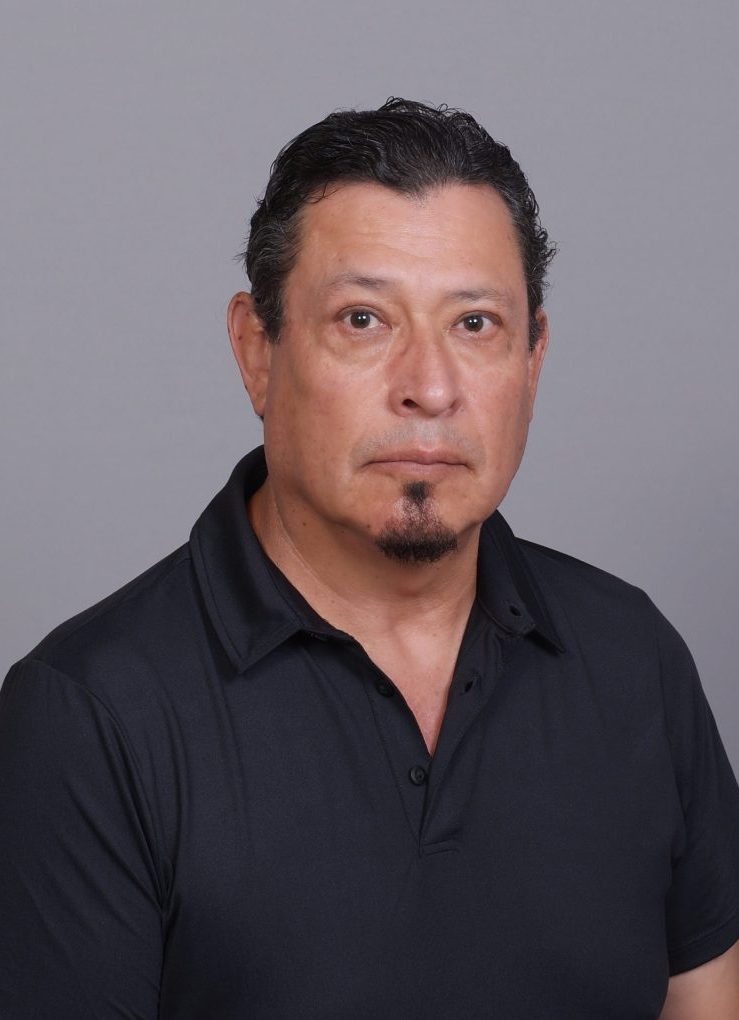
Emilio Zavala
IPM Specialist
Emilio began his journey in Agriculture while attending the local community college, and while learning about IPM, developed an interest in biological control. He obtained his Qualified Applicator License and his Pest Control Advisor License soon after. He has been working in the Ag industry for the past 8 years, concentrating his work in biological control to help farmers maximize their efforts to use natural resources in the best way possible. He continues to grow his knowledge in the Ag industry to help growers find the best solutions and help create a better environment for all.

Sarahlynne Guerrero Nohr
IPM Specialist
While earning her Bachelor’s and Master’s degrees in Entomology and Nematology, Sarahlynne interned with the University of Florida Extension Service and USDA-APHIS CAPS program for invasive pest surveillance. After graduation, she worked as a Chemical Sales
Representative for Dow AgroSciences (Corteva AgriSciences) in Southern California and for Winfield United (Heritage Professional Products Group) in South Florida. She later joined Nature’s Way Farms as a Senior Grower and then became IPM Manager for Costa Farms in Miami, FL. At Costa, she developed data-driven hybrid IPM programs, incorporating biologicals, insectary management, and business intelligence tools to meet the dynamic demands of the growing operation.

Cody Seals
US Product Manager
Cody Seals first began his journey into the world of plant pests and diseases while pursuing a bachelor’s degree in Plant and Soil Science from Middle Tennessee State University. He worked for University of Tennessee’s extension program in conjunction with USDA-APHIS on the state CAPS program, and upon completion of his bachelor’s degree in Entomology and Plant Pathology from University of Tennessee, he was offered an opportunity to attend their master’s program for entomology and plant pathology. With a focus on determining the ecology of cannabis produced in the Southeast, once he completed his master’s degree he remained in the cannabis space and began working with farmers across the southeast to navigate this new crop. He joined the Beneficial Insectary team in 2022 as U.S. Product Manager.

Erik Van Der Sluys
IPM Specialist
While working on a degree in Ecological Systems, Erik worked as a farm manager of a small two acre location in Seattle. After graduation, he got a job as a grower for a medicinal cannabis facility in Seattle. He then transferred to an ornamentals greenhouse in the Willamette Valley for a few years, where he gained the majority of his working knowledge using natural predators for pest management. Now working with the solutions, he provides to his clients all over the country.

Abbie Rosenthal
IPM Technical Specialist
Abbie has a degree in Agricultural Science. After previously working with Biobest, she has followed her passion in the agriculture industry while joining us at Beneficial Insectary. She continues to help farmers and ranchers grow a more sustainable crop by utilizing natural resources. Abbie has been working in biocontrol for 10 years, and is continuing to expand her knowledge of the industry by furthering her education. She’s here to help find solutions!

Cody Mitchem
IPM Specialist
Cody’s journey into IPM started in 2016 as a consulting arborist in Sarasota, FL. From that role he learned the basics of IPM and plant health. In 2019 he moved to Illinois, where he worked for two years as an IPM manager. He maintained an insectary to produce their own biologicals on site. While in Illinois he developed IPM programs for an 80+ acre hemp production and ornamental production. After leaving Illinois, he went to Costa Farms in Miami, FL. At Costa he developed IPM programs for all propagation and hibiscus stock. With an emphasis on using biologicals over chemicals, he developed an insectary to produce beneficials. He also combined conventional insecticides to develop an IPM program that used multiple methods of prevention.

Jasmine Horton
IPM Specialist
While pursuing her bachelor’s degree in plant science at the University of Florida, Jasmine interned at Costa Farms, where she built an insectary for the production of Dalotia coriaria and developed educational materials for scouts in the propagation and hibiscus stock areas. After graduating, she relocated to San Jose, California, where she served as both Nursery and IPM Manager for a 30,000 sq ft cannabis grow. Jasmine later transitioned to a role in Somerset, Kentucky, managing a 30-acre facility focused on cultivating strawberries and cucumbers under glass. There, she developed and implemented an IPM program for both crops, integrating biological controls with conventional pesticides.

Emilio Zavala
IPM Specialist
Emilio began his journey in Agriculture while attending the local community college, and while learning about IPM, developed an interest in biological control. He obtained his Qualified Applicator License and his Pest Control Advisor License soon after. He has been working in the Ag industry for the past 8 years, concentrating his work in biological control to help farmers maximize their efforts to use natural resources in the best way possible. He continues to grow his knowledge in the Ag industry to help growers find the best solutions and help create a better environment for all.

Sarahlynne Guerrero Nohr
IPM Specialist
While earning her Bachelor’s and Master’s degrees in Entomology and Nematology, Sarahlynne interned with the University of Florida Extension Service and USDA-APHIS CAPS program for invasive pest surveillance. After graduation, she worked as a Chemical Sales Representative for Dow AgroSciences (Corteva AgriSciences) in Southern California and for Winfield United (Heritage Professional Products Group) in South Florida. She later joined Nature’s Way Farms as a Senior Grower and then became IPM Manager for Costa Farms in Miami, FL. At Costa, she developed data-driven hybrid IPM programs, incorporating biologicals, insectary management, and business intelligence tools to meet the dynamic demands of the growing operation.
WHERE WE SERVE
Who Would Work With You
